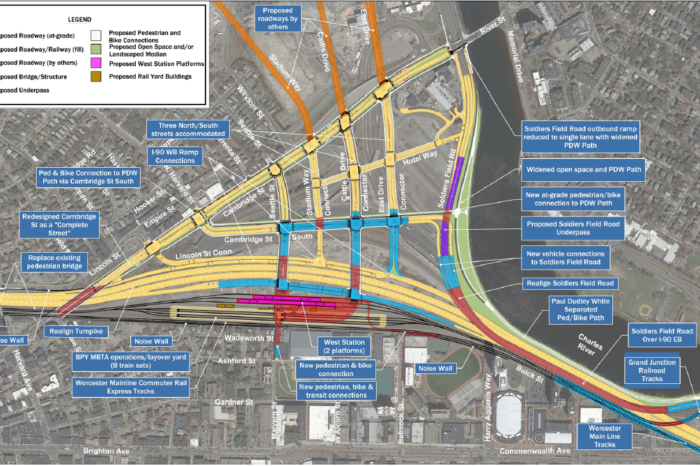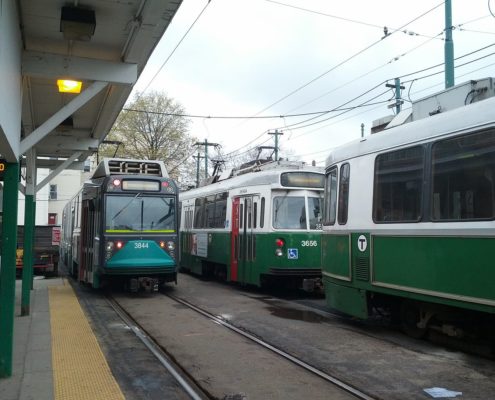Pioneer Urges MassDOT to Reconsider At-Grade Throat Option for I-90 Allston Multimodal Project
BOSTON – The Massachusetts Department of Transportation (MassDOT) should revise its Scoping Report on the I-90 Allston Multimodal Project and recommend an additional option to the Federal Highway Administration (FHWA), according to Pioneer Institute’s Public Comment to MassDOT and FHWA. The Institute believes that closer analysis of an at-grade option may reveal that an at-grade design will shorten construction time, lower costs, create fewer negative economic and congestion impacts, and improve neighborhood access to parkland along the Charles River.
The I-90 Allston Multimodal Project will cover nearly 150 acres bounded by the Framingham/Worcester Commuter Rail Line, Cambridge Street, and the Charles River. The Project aims to address a failing Massachusetts Turnpike viaduct over a former rail yard; facilitate safer, more efficient travel; and make way for a new urban neighborhood.
“The state’s approach to this project should reflect the interests of the commuters and neighborhoods most significantly impacted by it,” said Mary Connaughton, who co-authored “Public Comment on MassDOT’s I-90 Allston Multimodal Project National Environmental Policy Act Review Scoping Report” with Andrew Mikula. “To reflect those interests, the option MassDOT is currently recommending to the FHWA should be analyzed side by side with an at-grade option.”
In its Scoping Report, MassDOT recommends the “Soldiers Field Road Hybrid Option” for further environmental review by the FHWA. That approach would once again create a new viaduct to elevate Soldiers Field Road (SFR) and partially depress the Massachusetts Turnpike in a narrow section of the project called the “throat area” just east of Boston University’s Nickerson Field. It would also straighten the turnpike west of the throat area through former railyards owned by Harvard University.
Pioneer recommends a full review of a “Modified At-Grade Option” for the throat area that includes a permanent bicycle and pedestrian path bridge over the Charles River in the throat area, similar to what was previously proposed by A Better City. This option may minimize disruption to commuters, provide park users with a more pleasant environment, and allow both riverfront space and an all at-grade transportation corridor.
Remarkably, the MassDOT Scoping Report, in weighing its options, fails to consider construction costs, life-cycle costs, and the duration of project construction. The project will have significant daily impacts on commuters from the west and other commuters. MassDOT envisions that construction will take eight to 10 years and, for much of that time, the turnpike will be trimmed from eight to six lanes.
According to the Scoping Report, the SFR Hybrid Option, which MassDOT is promoting, would reduce the Framingham/Worcester Line from two tracks to one in the construction area for up to half of the project’s duration. Additionally, the Scoping Report states that under the SFR Hybrid Option, “construction staging for this option will necessarily require more time than other Throat options to move major utilities, construct the temporary trestle, and then sequentially construct the proposed railroad, interstate, and parkway infrastructure.”
MassDOT cited “unacceptable impacts on the water, parkland and historic resources of the Charles River Basin” as a major reason to remove at-grade options from consideration. Pioneer Institute believes that policymakers should recognize in developing the appropriate option for the project that the Charles River has undergone numerous changes over its history. Man-made alterations, from the construction of the Fens in 1878 to the reconstruction of the Charles River Dam in 1978, have yielded favorable results.
Pioneer’s recommendation of a Modified at-Grade Option, to include the bike and walking path on a bridge over the Charles, sees the change as an enhancement that allows neighborhood access to parkland and maintains resources for cyclists and pedestrians. Pioneer’s public comment aims to re-examine such an option as meeting the purpose and needs of the Allston Multimodal Project.
Pioneer’s comments also include suggested mitigation plans for those adversely impacted by the project.
Public comments on the project are due by December 12th.
About the Authors
Mary Z. Connaughton is Pioneer Institute’s Director of Government Transparency and Director of Finance and Administration. Previously, she served on the boards of the former Massachusetts Turnpike Authority, the Massachusetts Commission on Judicial Conduct, and the Commonwealth Corporation. She earned an M.B.A. from Assumption College, and holds degrees in accounting and English from the University of Massachusetts at Amherst.
Andrew Mikula is the Lovett & Ruth Peters Economic Opportunity Fellow at Pioneer Institute. Mr. Mikula was previously a Roger Perry Government Transparency Intern at Pioneer Institute and studied economics at Bates College.
About Pioneer
Pioneer Institute is an independent, non-partisan, privately funded research organization that seeks to improve the quality of life in Massachusetts through civic discourse and intellectually rigorous, data-driven public policy solutions based on free market principles, individual liberty and responsibility, and the ideal of effective, limited and accountable government.
Get Updates on Our Transportation Research
Related Posts











